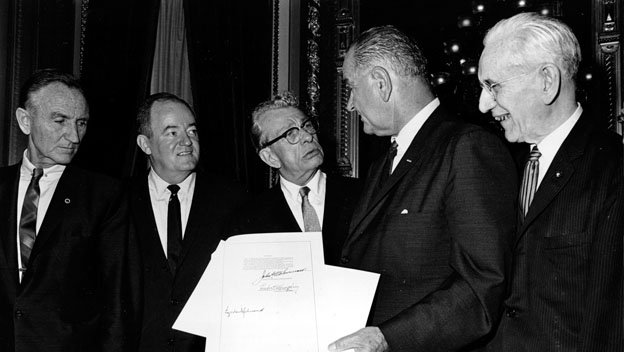This day in 1965 Johnson calls for equal voting rights

On this day in 1965, President Lyndon B. Johnson addressed a joint session of Congress to urge the passage of legislation guaranteeing voting rights for all.
Using the phrase “we shall overcome,” borrowed from African-American leaders struggling for equal rights, Johnson declared that “every American citizen must have an equal right to vote.” Johnson reminded the nation that the Fifteenth Amendment, which was passed after the Civil War, gave all citizens the right to vote regardless of race or color. But states had defied the Constitution and erected barriers. Discrimination had taken the form of literacy, knowledge or character tests administered solely to African-Americans to keep them from registering to vote.
“Their cause must be our cause too,”Johnson said that “Because it is not just Negroes, but really it is all of us, who have must overcome the crippling legacy of bigotry and injustice. And we shall be overcome.”
The speech was delivered at eight days after racial violence erupted in Selma, Alabama. Civil rights leader Rev. Martin Luther King and over 500 supporters were attacked while planning a march from Selma to Montgomery to register African-Americans to vote. The police violence that erupted resulted in the death of a King supporter, a white Unitarian Minister from Boston named James J. Reeb. Television news coverage of the event galvanized voting rights supporters in Congress.
A second attempt to march to Montgomery was also blocked by the police. It took Federal intervention with the “federalizing” of the Alabama national guard and the addition of over 2,500 other guards to allow the march to begin.
The march to Montgomery finally began March 21 with over 3,500 participants under the glare of worldwide news publicity.
The violence, however, continued. Just after the march was successfully completed on March 25, four Klansman shot and killed Detroit homemaker Viola Liuzzo as she drove marchers back to Selma.
On August 6, 1965, Johnson signed the Voting Rights Act, which made it illegal to impose restrictions on federal, state and local elections that were designed to deny the vote to blacks.
While state and local enforcement of the act was initially weak, mainly in the South, the Voting Rights Act gave African-American voters the legal means to challenge voting restrictions and vastly improved voter turnout. In Mississippi alone, voter turnout among blacks increased from 6 percent in 1964 to 59 percent in 1969.
In 1970, President Richard Nixon extended the provisions of the Voting Rights Act and lowered the eligible voting age for all voters to 18.